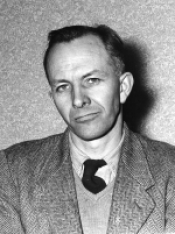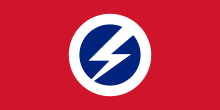
Sir Oswald Ernald Mosley, 6th Baronet was a British politician during the 1920s and 1930s who rose to fame when, having become disillusioned with mainstream politics, he turned to fascism. He was a member of parliament and later founded and led the British Union of Fascists (BUF).

Arthur Kenneth Chesterton was a British far-right journalist and political activist. From 1933 to 1938, he was a member of the British Union of Fascists (BUF). Disillusioned with Oswald Mosley, he left the BUF in 1938. Chesterton established the League of Empire Loyalists in 1954, which merged with a short-lived British National Party in 1967 to become the National Front. He founded and edited the magazine Candour in 1954 as the successor of Truth, of which he had been co-editor.

The White Defence League (WDL) was a British neo-Nazi political party. Using the provocative marching techniques popularised by Oswald Mosley, its members included John Tyndall.

Arnold Spencer Leese was a British fascist politician. Leese was initially prominent as a veterinary expert on camels. A virulent anti-Semite, he led his own fascist movement, the Imperial Fascist League, and was a prolific author and publisher of polemics both before and after the Second World War.

The Imperial Fascist League (IFL) was a British fascist political movement founded by Arnold Leese in 1929 after he broke away from the British Fascists. It included a blackshirted paramilitary arm called the Fascists Legion, modelled after the Italian Fascists. The group espoused antisemitism and the dominance of the 'Aryan race' in a 'Racial Fascist Corporate State', especially after Leese met Nazi Party propagandist Julius Streicher, the virulently racist publisher of Der Stürmer; the group later indirectly received funding from the Nazis. Although it had only between 150 and 500 members at maximum, its public profile was higher than its membership numbers would indicate.
The National Fascisti (NF), renamed British National Fascists (BNF) in July 1926, were a splinter group from the British Fascisti formed in 1924. In the early days of the British Fascisti the movement lacked any real policy or direction and so this group split away with the intention of pursuing a more definite path towards a fascist state. The group had 60 members at its creation, and around 500 at its height.

The National Socialist League (NSL) was a short-lived Nazi political movement in the United Kingdom immediately prior to the Second World War.

John Warburton Beckett was a British politician who was a Labour Party MP from 1924 to 1931. During the 1930s, he joined the fascist movement, first in the British Union of Fascists and later as a founder of the National Socialist League. During World War II, he was interned in Britain.

Rotha Beryl Lintorn Lintorn-Orman was the founder of the British Fascisti, the first avowedly fascist movement to appear in British politics.

Edward Jeffrey Hamm was a leading British fascist and supporter of Oswald Mosley. Although a minor figure in Mosley's prewar British Union of Fascists, Hamm became a leading figure after the Second World War and eventually succeeded as leader of the Union Movement after Mosley's retirement.
Alexander Raven Thomson, usually referred to as Raven, was a Scottish politician and philosopher. He joined the British Union of Fascists in 1933 and remained a follower of Oswald Mosley for the rest of his life. Thomson was considered to be the party's chief ideologue and has been described as the "Alfred Rosenberg of British fascism".
The British People's Party (BPP) was a British far-right political party founded in 1939 and led by ex-British Union of Fascists (BUF) member and Labour Party Member of Parliament John Beckett.

The National Party of Europe (NPE) was an initiative undertaken by a number of political parties in Europe during the 1960s to help increase cross-border co-operation and work towards European unity. Under the direction of Oswald Mosley, a pre-war British fascist leader who returned to politics after the Second World War, the group aimed to bring together and merge a number of far-right groups from across the continent, all of which shared at least some commitment to a wider pan-European nationalism. The group failed to achieve its aims as most of its member groups preferred to maintain their independence.
The European Social Movement was a neo-fascist Europe-wide alliance set up in 1951 to promote pan-European nationalism.

Jorian Edward Forwood Jenks was an English farmer, environmentalism pioneer and fascist. He has been described as "one of the most dominant figures in the development of the organic movement".
British fascism is the form of fascism which is promoted by some political parties and movements in the United Kingdom. It is based on British ultranationalism and imperialism and had aspects of Italian fascism and Nazism both before and after World War II.

The Union Movement (UM) was a far-right political party founded in the United Kingdom by Oswald Mosley. Before the Second World War, Mosley's British Union of Fascists (BUF) had wanted to concentrate trade within the British Empire, but the Union Movement attempted to stress the importance of developing a European nationalism, rather than a narrower country-based nationalism. That has caused the UM to be characterised as an attempt by Mosley to start again in his political life by embracing more democratic and international policies than those with which he had previously been associated. The UM has been described as post-fascist by former members such as Robert Edwards, the founder of the pro-Mosley European Action, a British pressure group.
Neil Lanfear Maclean Francis Hawkins was a British writer and politician who was a leading proponent of British fascism in the United Kingdom both before and after the Second World War. He played a leading role in the British Union of Fascists and controlled the organisational structure of the movement.

Robert Row (1915–1999) was an English fascist from Lancaster, a member of Oswald Mosley's British Union of Fascists (BUF) who was detained by the British government under Defence Regulation 18B during the Second World War. After the war, he wrote and edited British fascist publications and remained a believer in Mosley until his death.













